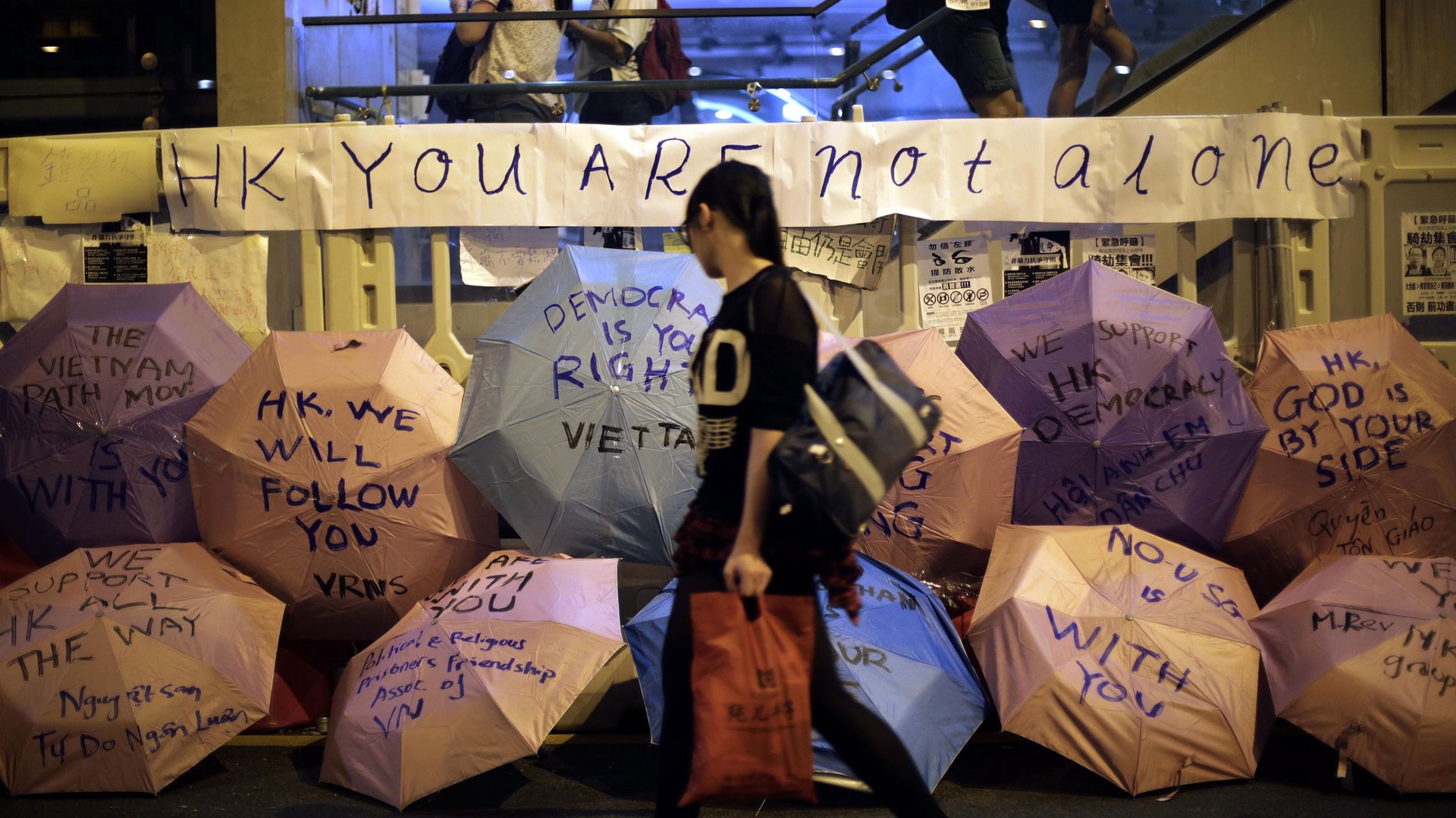Hong Kong protestors might fail but that doesn’t mean the West shouldn’t take them seriously
Nascent political movements are a little like the Hunger Games. The odds are almost never in the little guys’ favor, which is why we marvel at the fall of the Berlin Wall or the success of Rosa Parks and the Montgomery Bus Boycott.


Nascent political movements are a little like the Hunger Games. The odds are almost never in the little guys’ favor, which is why we marvel at the fall of the Berlin Wall or the success of Rosa Parks and the Montgomery Bus Boycott.
Last week, Jeff Bader, the Obama administration’s former top adviser on Asia, gave a stark prediction: Hong Kong protestors will almost certainly fail in their demands for universal suffrage. The reality, Bader told the Washington Post, is “Beijing is quite intractable.”
Bader’s assessment is brutal, but fair.
There are, however, pundits who lack Bader’s discernment, and confuse saying “it’s unrealistic” with “it’s absurd.” They sway readers by obfuscating two lines of thinking: Something is difficult to obtain, ergo, it is unworthy of attempt.
Martin Jacques’s piece “China is Hong Kong’s Future, Not It’s Enemy” is a classic in this vein. Its logic flows thus:
- Hong Kong never had democracy as a British colony
- The city has enjoyed more freedoms under Chinese rule than British, and more so than any city on mainland China
- To ask for more is unrealistic, overreaching and flat out ungrateful
Writes Jacques: “Although Hong Kong came, over time, to enjoy the rule of law and the right to protest, under the British it never enjoyed even a semblance of democracy. It was ruled from 6,000 miles away in London. The idea of any kind of democracy was first introduced by the Chinese government.”
Let’s put this old saw to bed once and for all. China did not grant Hong Kong these freedoms easily or even willingly. Although Britain was shamefully slow in introducing democracy to Hong Kong—and remains shamefully mute on current proceedings—they were the ones who introduced the first elections in 1980s and greatly expanded them in the 1990s. China fought “tooth and nail” against this, said constitutional scholar and Basic Law expert Danny Gittings, issuing “repeated public warnings to Britain to slow down the introduction of democracy.”
After 1997, some aspects of the expansion of the electoral franchise introduced by Hong Kong’s last governor Chris Patten were rolled back. (Patten’s attempts to inject greater choice into Hong Kong’s system earned him charming sobriquets like “serpent” and “Whore of the East” from Chinese officials.)
People in Hong Kong understandably want a more balanced system now. Currently, special interest groups like the financial and real estate industries have a disproportionate amount of power in electing both Hong Kong’s leader and members of the Legislative Council.
Article 45 of the Basic Law, Hong Kong’s mini-constitution, states: “The ultimate aim is the selection of the chief executive by universal suffrage upon nomination by a broadly representative nominating committee in accordance with democratic procedures.”
This was a sop given to Hong Kong’s democrats, who fought hard for this concession. It was something Beijing grudgingly granted, after much wrangling, and was not present in the early drafts of the Basic Law.
At the heart of last week’s street protests are different interpretations of the phrase “broadly representative.” Lawyers can dance on the head of a pin debating this one out, but most reasonable people can understand why Hong Kong protestors might take issue with Beijing’s narrow interpretation: just two or three choices, pre-approved by Chinese authorities.
To understand the Hong Kong protests, we need to separate what’s realistic from what’s right. Clearly, Hong Kong’s protestors have an uphill slog. The possibility of Beijing making significant concessions are almost nil. But it doesn’t make for an intelligent argument to denigrate their goals or aspirations, or portray them as adolescents acting out. There are, of course, quite a lot of young protestors, but so far—though things may of course change—the peaceable, reasoned nature of the protests has been marked by a maturity not seen in Tahrir or Tiananmen.
This Wall Street Journal piece notes “pro-democracy protesters aren’t realists; they’re idealists. Besides, the college students don’t remember British days; high-schoolers weren’t even born then.”
Again with the childish trope, Martin Jacques suggests Hong Kong’s demands are rooted in old-fashioned jealousy. Hong Kong, he says, “got rich because of China,” which fed “an attitude of hubris and arrogance.” Now that the Chinese economy has grown so much, “Hong Kong has lost its role as the gateway to China.”
In his portrayal of the Hong Kong-China relationship, China is clearly the more mature partner, so far tolerant of the city’s sullen, teenage behavior. “The Chinese have persisted with what can best be described as a hands-off approach,” he writes. (Which is hardly true.)
Singapore’s Foreign Affairs minister K. Shanmugam notes Beijing’s proposal is “more than what Hong Kong ever had under the British.”
If these pundits were writing about the women’s suffrage movement, they’d be saying: “Be grateful for shoes, not bound feet. What’s all this fuss about equal pay for equal work?”